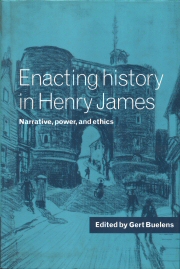Book contents
- Frontmatter
- Contents
- Notes on contributors
- Acknowledgments
- List of abbreviations
- Introduction
- 1 Power relations in the novels of James: the ‘liberal’ and the ‘radical’ version
- 2 Multiple germs, metaphorical systems, and moral fluctuation in The Ambassadors
- 3 James and the ethics of control: aspiring architects and their floating creatures
- 4 James and the shadow of the Roman Empire: manners and the consenting victim
- 5 ‘What Maisie knew’: Henry James's Bildungsroman of the artist as queer moralist
- 6 The double narrative of ‘The Beast in the Jungle’: ethical plot, ironical plot, and the play of power
- 7 Homoeroticism, identity, and agency in James's late tales
- 8 ‘A provision full of responsibilities’: senses of the past in Henry James's fourth phase
- 9 Possessing the American scene: race and vulgarity, seduction and judgment
- 10 History, narrative, and responsibility: speech acts in ‘The Aspern Papers’
- Index
6 - The double narrative of ‘The Beast in the Jungle’: ethical plot, ironical plot, and the play of power
Published online by Cambridge University Press: 02 February 2010
- Frontmatter
- Contents
- Notes on contributors
- Acknowledgments
- List of abbreviations
- Introduction
- 1 Power relations in the novels of James: the ‘liberal’ and the ‘radical’ version
- 2 Multiple germs, metaphorical systems, and moral fluctuation in The Ambassadors
- 3 James and the ethics of control: aspiring architects and their floating creatures
- 4 James and the shadow of the Roman Empire: manners and the consenting victim
- 5 ‘What Maisie knew’: Henry James's Bildungsroman of the artist as queer moralist
- 6 The double narrative of ‘The Beast in the Jungle’: ethical plot, ironical plot, and the play of power
- 7 Homoeroticism, identity, and agency in James's late tales
- 8 ‘A provision full of responsibilities’: senses of the past in Henry James's fourth phase
- 9 Possessing the American scene: race and vulgarity, seduction and judgment
- 10 History, narrative, and responsibility: speech acts in ‘The Aspern Papers’
- Index
Summary
Revising ‘The Beast in the Jungle’ for the New York edition, James was led to reflect: ‘my attested predilection for poor sensitive gentlemen almost embarrasses me as I march!’ (AD, ix). James's embarrassment, never very acute in recording his impressions of his own work, would probably have been more pronounced than this had he known what posterity was to make of his predilection; but as it stands, his assumed ruefulness is still useful as a reminder that yes, poor sensitive gentlemen do abound in James, their very sensitivity frequently serving as the privileged and controlling medium of the fiction. If James is, as Conrad suggested, the historian of fine consciences, the histories of these sensitive gentlemen would seem to be pre-eminently the Jamesian subject.
But, at roughly the same time as writing his Prefaces, James was speaking, in ‘The Story in It’ (1902), for the narrative potential of a different kind of history ― though ‘speaking’ is, as often, too crude a word for the indirection of James's method of utterance. He dramatizes his subject as a discussion amongst three people on the question of what constitutes a worthy ‘subject’ for a writer. Maud Blessingbourne, complaining of the ‘poverty of the life’ in the French novel she has just unenthusiastically finished, explains to her more worldly-wise companions: ‘Well, I suppose I'm looking, more than anything else, for a decent woman’ (DM, 422).
- Type
- Chapter
- Information
- Enacting History in Henry JamesNarrative, Power, and Ethics, pp. 109 - 125Publisher: Cambridge University PressPrint publication year: 1997



